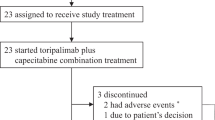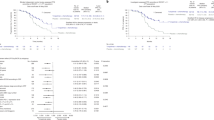Abstract
Purpose
Immune checkpoint inhibitor (ICI) monotherapy and chemotherapy (CT) have been used to treat recurrent or metastatic nasopharyngeal carcinoma (R/M-NPC), with demonstrated survival benefits and good safety. However, whether combination therapy is superior to CT alone remains unclear. We summarized the existing evidence comparing the effectiveness and toxicities of ICI combined with CT versus CT alone.
Methods
Online databases was conducted for eligible randomized controlled trials (RCTs) published up to November 1, 2023. Progression-free survival (PFS) and overall survival (OS) were the primary endpoint. Objective response rates (ORRs) and adverse events (AEs) were the secondary endpoint.
Results
Three randomized controlled trials (Capture-1st, JUPITER-02, and RATIONALE-309) were included. First-line ICI therapy combined with CT showed significant improvement in PFS (hazard ratio[HR], 0.53; 95% confidence interval[CI]: 0.44–0.64), OS (HR, 0.63;95%CI: 0.49–0.81) and ORRs (odds ratio[OR], 1.79;95%CI: 1.30–2.46), when compared with CT alone. AEs ≥ grade 3 during treatment and treatment-related deaths were not significantly different between the two groups.
Conclusions
In patients with R/M-NPC, ICI therapy combined with CT showed improved ORRs, PFS, and OS, with similar safety as CT alone.





Similar content being viewed by others
Abbreviations
- R/M-NPC:
-
Recurrent or metastatic nasopharyngeal carcinoma
- ICI:
-
Immune checkpoint inhibitor
- CT:
-
Chemotherapy
- RCT:
-
Randomized controlled trial
- ORR:
-
Objective response rate
- PFS:
-
Progression-free survival
- OS:
-
Overall survival
- AE:
-
Adverse event
- EBV:
-
Epstein-Barr virus
- IMRT:
-
Intensity-modulated radiotherapy
- PD-1:
-
Programmed cell death protein-1
- PD-L1:
-
Programmed cell death 1 ligand 1
- DOR:
-
Duration of response
- CIs:
-
Confidence intervals
- HR:
-
Hazard ratio
References
Chen Y-P, Chan ATC, Le Q-T et al (2019) Nasopharyngeal carcinoma. Lancet 394:64–80. https://doi.org/10.1016/S0140-6736(19)30956-0
Sung H, Ferlay J, Siegel RL et al (2021) Global Cancer statistics 2020: GLOBOCAN estimates of incidence and Mortality Worldwide for 36 cancers in 185 countries. CA Cancer J Clin 71:209–249. https://doi.org/10.3322/caac.21660
Wong KCW, Hui EP, Lo K-W et al (2021) Nasopharyngeal carcinoma: an evolving paradigm. Nat Rev Clin Oncol 18:679–695. https://doi.org/10.1038/s41571-021-00524-x
Zhang L, Huang Y, Hong S et al (2016) Gemcitabine plus cisplatin versus fluorouracil plus cisplatin in recurrent or metastatic nasopharyngeal carcinoma: a multicentre, randomised, open-label, phase 3 trial. Lancet 388:1883–1892. https://doi.org/10.1016/S0140-6736(16)31388-5
Huang Z-L, Liu S, Wang G-N et al (2019) The prognostic significance of PD-L1 and PD-1 expression in patients with nasopharyngeal carcinoma: a systematic review and meta-analysis. Cancer Cell Int 19:141. https://doi.org/10.1186/s12935-019-0863-5
Xu J-Y, Wei X-L, Wang Y-Q, Wang F-H (2022) Current status and advances of immunotherapy in nasopharyngeal carcinoma. Ther Adv Med Oncol 14:17588359221096214. https://doi.org/10.1177/17588359221096214
Yang Y, Qu S, Li J et al (2021) Camrelizumab versus placebo in combination with gemcitabine and cisplatin as first-line treatment for recurrent or metastatic nasopharyngeal carcinoma (CAPTAIN-1st): a multicentre, randomised, double-blind, phase 3 trial. Lancet Oncol 22:1162–1174. https://doi.org/10.1016/S1470-2045(21)00302-8
Yang Y, Pan J, Wang H et al (2023) Tislelizumab plus chemotherapy as first-line treatment for recurrent or metastatic nasopharyngeal cancer: a multicenter phase 3 trial (RATIONALE-309). Cancer Cell 41:1061–1072e4. https://doi.org/10.1016/j.ccell.2023.04.014
Mai H-Q, Chen Q-Y, Chen D et al (2023) Toripalimab Plus Chemotherapy for recurrent or metastatic nasopharyngeal carcinoma: the JUPITER-02 Randomized Clinical Trial. JAMA 330:1961–1970. https://doi.org/10.1001/jama.2023.20181
Higgins JPT, Altman DG, Gøtzsche PC et al (2011) The Cochrane collaboration’s tool for assessing risk of bias in randomised trials. BMJ 343:d5928. https://doi.org/10.1136/bmj.d5928
Chan ATC, Lee VHF, Hong R-L et al (2023) Pembrolizumab monotherapy versus chemotherapy in platinum-pretreated, recurrent or metastatic nasopharyngeal cancer (KEYNOTE-122): an open-label, randomized, phase III trial. Ann Oncol 34:251–261. https://doi.org/10.1016/j.annonc.2022.12.007
Fang W, Yang Y, Ma Y et al (2018) Camrelizumab (SHR-1210) alone or in combination with gemcitabine plus cisplatin for nasopharyngeal carcinoma: results from two single-arm, phase 1 trials. Lancet Oncol 19:1338–1350. https://doi.org/10.1016/S1470-2045(18)30495-9
Li W, Duan X, Chen X et al (2022) Immunotherapeutic approaches in EBV-associated nasopharyngeal carcinoma. Front Immunol 13:1079515. https://doi.org/10.3389/fimmu.2022.1079515
Johnson D, Ma BBY (2021) Targeting the PD-1/ PD-L1 interaction in nasopharyngeal carcinoma. Oral Oncol 113:105127. https://doi.org/10.1016/j.oraloncology.2020.105127
Hsu C, Lee S-H, Ejadi S et al (2017) Safety and Antitumor Activity of Pembrolizumab in patients with programmed death-ligand 1-Positive nasopharyngeal carcinoma: results of the KEYNOTE-028 study. J Clin Oncol 35:4050–4056. https://doi.org/10.1200/JCO.2017.73.3675
Ma BBY, Lim W-T, Goh B-C et al (2018) Antitumor Activity of Nivolumab in recurrent and metastatic nasopharyngeal carcinoma: an International, Multicenter Study of the Mayo Clinic Phase 2 Consortium (NCI-9742). J Clin Oncol 36:1412–1418. https://doi.org/10.1200/JCO.2017.77.0388
Yang Y, Zhou T, Chen X et al (2021) Efficacy, safety, and biomarker analysis of Camrelizumab in previously treated recurrent or metastatic nasopharyngeal carcinoma (CAPTAIN study). J Immunother Cancer 9:e003790. https://doi.org/10.1136/jitc-2021-003790
Wang F-H, Wei X-L, Feng J et al (2021) Efficacy, Safety, and Correlative Biomarkers of Toripalimab in previously treated recurrent or metastatic nasopharyngeal carcinoma: a phase II clinical trial (POLARIS-02). J Clin Oncol 39:704–712. https://doi.org/10.1200/JCO.20.02712
Luo J, **ao W, Hua F et al (2023) Efficacy and safety of PD-1 inhibitors in recurrent or metastatic nasopharyngeal carcinoma patients after failure of platinum-containing regimens: a systematic review and meta-analysis. BMC Cancer 23:1172. https://doi.org/10.1186/s12885-023-11318-y
Gadgeel S, Rodríguez-Abreu D, Speranza G et al (2020) Updated analysis from KEYNOTE-189: Pembrolizumab or Placebo Plus Pemetrexed and Platinum for previously untreated metastatic nonsquamous non-small-cell Lung Cancer. J Clin Oncol 38:1505–1517. https://doi.org/10.1200/JCO.19.03136
Liu SV, Reck M, Mansfield AS et al (2021) Updated overall survival and PD-L1 subgroup analysis of patients with extensive-stage small-cell lung Cancer treated with atezolizumab, carboplatin, and Etoposide (IMpower133). J Clin Oncol 39:619–630. https://doi.org/10.1200/JCO.20.01055
Sun J-M, Shen L, Shah MA et al (2021) Pembrolizumab plus chemotherapy versus chemotherapy alone for first-line treatment of advanced oesophageal cancer (KEYNOTE-590): a randomised, placebo-controlled, phase 3 study. Lancet 398:759–771. https://doi.org/10.1016/S0140-6736(21)01234-4
Emens LA, Adams S, Barrios CH et al (2021) First-line atezolizumab plus nab-paclitaxel for unresectable, locally advanced, or metastatic triple-negative breast cancer: IMpassion130 final overall survival analysis. Ann Oncol 32:983–993. https://doi.org/10.1016/j.annonc.2021.05.355
Janjigian YY, Shitara K, Moehler M et al (2021) First-line nivolumab plus chemotherapy versus chemotherapy alone for advanced gastric, gastro-oesophageal junction, and oesophageal adenocarcinoma (CheckMate 649): a randomised, open-label, phase 3 trial. Lancet 398:27–40. https://doi.org/10.1016/S0140-6736(21)00797-2
Sun L, Chen L, Li H (2019) Checkpoint-modulating immunotherapies in tumor treatment: targets, drugs, and mechanisms. Int Immunopharmacol 67:160–175. https://doi.org/10.1016/j.intimp.2018.12.006
Apetoh L, Ladoire S, Coukos G, Ghiringhelli F (2015) Combining immunotherapy and anticancer agents: the right path to achieve cancer cure? Ann Oncol 26:1813–1823. https://doi.org/10.1093/annonc/mdv209
You R, Liu Y-P, Lin M et al (2019) Relationship of circulating tumor cells and Epstein-Barr virus DNA to progression-free survival and overall survival in metastatic nasopharyngeal carcinoma patients. Int J Cancer 145:2873–2883. https://doi.org/10.1002/ijc.32380
Chen Y-P, Lv J-W, Mao Y-P et al (2021) Unraveling tumour microenvironment heterogeneity in nasopharyngeal carcinoma identifies biologically distinct immune subtypes predicting prognosis and immunotherapy responses. Mol Cancer 20:14. https://doi.org/10.1186/s12943-020-01292-5
Qian X, Chen H, Tao Y (2023) Biomarkers predicting clinical outcomes in nasopharyngeal cancer patients receiving immune checkpoint inhibitors: a systematic review and meta-analysis. Front Immunol 14:1146898. https://doi.org/10.3389/fimmu.2023.1146898
Acknowledgements
For improving the final version of the manuscript, we are grateful to the comments provided by reviewers and the editor, which were of great value. Thank you for the language assistance provided by Editage.
Funding
This work was supported by grants from the National Natural Science Foundation of China (No. 82272736,82160467,81460460,81760542), the Research Foundation of the Science and Technology Department of Guangxi Province, China (grant No. 2023GXNSFDA026009, 2016GXNSFAA380252, 2018AB61001 and 2014GXNSFBA118114), the Research Foundation of the Health Department of Guangxi Province, China (No.S2018087), Guangxi Medical University Training Program for Distinguished Young Scholars (2017), Medical Excellence Award Funded by the Creative Research Development Grant from the First Affiliated Hospital of Guangxi Medical University (2016). Guangxi Medical High-level Talents Training Program. The central government guide local science and technology development projects (ZY18057006).
Author information
Authors and Affiliations
Contributions
(i) Conception and design: SW and MK; (ii) Administrative support: MK; (iii) Collection and selection of data: SW, XH; (iv) Data analysis and interpretation: ZZ, RL; (v) Manuscript writing: all authors; (vi) Final approval of manuscript: all authors.
Corresponding author
Ethics declarations
Competing interests
The authors declare that they have no conflict of interest.
Additional information
Publisher’s Note
Springer Nature remains neutral with regard to jurisdictional claims in published maps and institutional affiliations.
Rights and permissions
Springer Nature or its licensor (e.g. a society or other partner) holds exclusive rights to this article under a publishing agreement with the author(s) or other rightsholder(s); author self-archiving of the accepted manuscript version of this article is solely governed by the terms of such publishing agreement and applicable law.
About this article
Cite this article
Wang, S., Huang, X., Li, R. et al. Immune checkpoint inhibitor combined with chemotherapy versus chemotherapy alone in the first-line treatment for recurrent or metastatic nasopharyngeal carcinoma: a meta-analysis of random controlled trials. Eur Arch Otorhinolaryngol (2024). https://doi.org/10.1007/s00405-024-08768-w
Received:
Accepted:
Published:
DOI: https://doi.org/10.1007/s00405-024-08768-w




